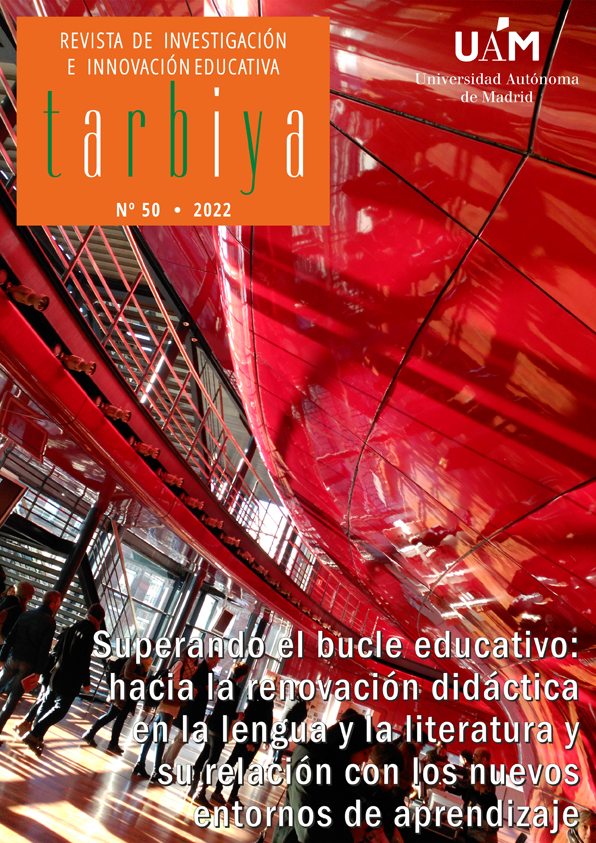Implementation and development of a Future Classroom Lab in a school setting. Study of the project of IES Francisco Giner de los Ríos, Alcobendas
Keywords:
Future Classroom Lab, Innovation, Competency-based approach, Active learning methodologies, Digital Technologies and Innovative Learning EnvironmentsAbstract
IES Francisco Giner de los Ríos is located in Alcobendas, a city in the outskirts of Madrid inhabited by more than one
hundred thousand people. It has more than forty years of teaching experience and around 1500 students, which entails
a wide and varied educational offer. The students enrolled in this school are diverse, due to both their origin (including
up to forty different nationalities) and their sociocultural and academic levels. This gives it great cultural diversity, which
undoubtedly enriches it as an educational institution, but it also comes with a considerable challenge.
After the granting by the Community of Madrid of economic support resulting from its selection in the Call for Innovation
Projects of the Community of Madrid in 2018, the project “New Spaces for Learning: The Future Classroom Lab” was
implemented in this school. This project collected the experience and concerns of a group of teachers who were firmly
committed to methodological transformation. Supported by the management team, they initiated a process of
transformation of spaces, promotion of digital technologies, and implementation of active methodologies as an
instrument to develop students key competences. It also intended, taking as a model the European project Future
Classroom Lab (FCL) of European Schoolnet, coordinated by the INTEF, in collaboration with the autonomous
communities.
Downloads
References
ARCOS, A. (21 de enero de 2020). Nuevos espacios de aprendizaje: el entorno cuenta en Educación. Magisterio. https://www.magisnet.com/2020/01/9-nuevos-espacios-de-aprendizaje-el-entorno-cuenta-en-educacion/
ARANDA MARTÍNEZ, A. Y HERNÁNDEZ PRADOS, M.A. (2020). La construcción de entornos educativos como recurso metodológico. En Ramón Rivera Espinosa (Coord.), V Congreso internacional virtual sobre La Educación en el Siglo XXI (pp.440–450). https://www.eumed.net/actas/20/educacion/38-la-construccion-de-entornos-educativos-como-recurso-metodologico.pdf
DÍAZ-BARRIGA ARCEO, F. Y HERNÁNDEZ ROJAS, G. (2000). Estrategias docentes para un aprendizaje significativo. Mc Graw Hill.
FERNÁNDEZ ENGUITA, M. (2019). Del aula-huevera a la hiperaula. Cuaderno de Campo. https://blog.enguita.info/2019/04/del-aula-huevera-la-hiperaula.html
HILARIO SILVA, P., MAESTRO LUENGO, L.A., MOYA, C. Y VALLADARES, M. (2020). Metodologías para una educación innovadora. Casos prácticos. Aplicación práctica en nuevos espacios para el aprendizaje. Editorial Wolters Kluwer.
INSTITUTO NACIONAL DE TECNOLOGÍAS EDUCATIVAS Y DE FORMACIÓN DEL PROFESORADO (23 de enero de 2023). El proyecto pedagógico del IES Francisco Giner de los Ríos. Aula del Futuro. https://auladelfuturo.intef.es/experiencias/el-proyecto-pedagogico-del-ies-francisco-giner-de-los-rios/
LASNIER, F. (2000). Réussir la formation par compétences. Guérin.
MALAGUZZI, L. (1984). L’occhio se salt ail muro. Catalog of the Exhibit. Comune di Reggio.
MALPICA CAPACHO, A. (2020). Integración de la educación digital y los aportes de las TIC, JCLIC a los procesos de enseñanza y aprendizaje en la escuela. Revista Pensamiento Udecino, 4(1). http://portal.amelica.org/ameli/jatsRepo/301/3011614007/index.html
PÁRAMO, P. Y BURBANO, A. (Eds.) (2021). El tercer maestro: la dimensión espacial del ambiente educativo y su influencia sobre el aprendizaje. Universidad Pedagógica Nacional.
RUBIO HERNÁNDEZ, F.J. Y OLIVO-FRANCO, J.L. (2020). Dificultades del profesorado en sus funciones docentes y posibles soluciones. Un estudio descriptivo actualizado. Ciencia y Educación, 4(2), 7–25. https://doi.org/10.22206/cyed.2020.v4i2.pp7-25
RUBIO PULIDO, M. (16 de abril de 2018). CREA con Diseño Universal para el Aprendizaje. Emtic - Portal de innovación y tecnología educativa. https://emtic.educarex.es/224-emtic/atencion-a-la-diversidad/3079-crea-con-diseno-universal-para-elaprendizaje
SOLANAS, I. (25 de noviembre de 2020): Modelo pedagógico para un Aula RTC. Grupo AE. https://grupo-ae.com/modelo-pedagogico-para-un-aula-rtc/4899006959/
TORREGO, J.C. (Coord.) (2011). Alumnos con altas capacidades y aprendizaje cooperativo. Fundación SM.
VALIENTE BARDERAS, A. Y GALDEANO BIENZOBAS, C. (2009). La enseñanza por competencias. Educación Química, 20(3),

